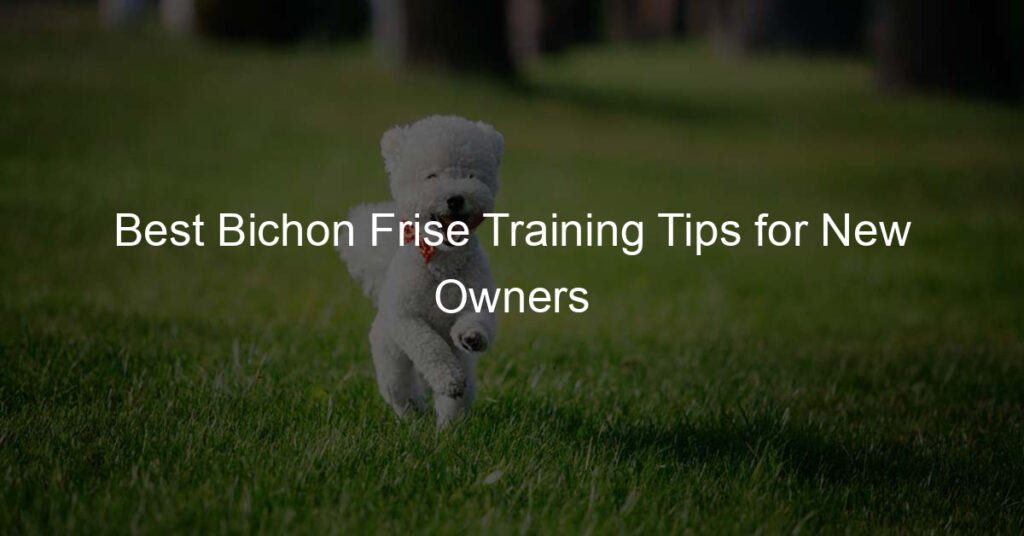Whether you’re a first-time Bichon Frise owner, or you’re looking to add another one to your family, there are some important things to know about training. With the right approach, Bichons can be relatively easy to train – but as with any dog, there are certain things that you’ll need to keep in mind. In this blog post, we’ll share some of our best tips for training Bichons. We hope you find them helpful!
1. Start Early: The best way to ensure that your Bichon has good manners and obeys commands is to start training as early as possible. Since Bichons are intelligent dogs, they often pick up on new concepts quickly.
2. Use Positive Reinforcement: Bichons respond well to positive reinforcement, so focus on rewarding your pup with lots of treats and verbal praise when they do something right.
3. Focus on Socialization: Socializing your Bichon with other dogs is essential for their development and behavior. Take them to the park or join a local dog club so they can interact with other pups in a safe environment.
4. Utilize Clicker Training: Clicker training is a great way to train your Bichon because it helps them understand what behaviors you expect from them. You can use the clicker to mark desired behaviors and reward those behaviors with treats or verbal praise.
5. Practice Consistency: When teaching your pup new commands or behaviors, it’s important to be consistent. If you don’t reward them or praise them enough, they may not understand what’s expected of them.
By following these tips, you’ll be well on your way to having a well-trained Bichon Frise! Good luck and happy training!
Is Bichon Frise good for first-time owners?
Bichon Frise is one of the smartest breeds around, making them a great pick for first-time owners. If you’re looking for an active and loyal companion that’s savvy enough to pick up on new tasks quickly, Bichons rank high when it comes to obedience training.
Even though they can be demanding and are prone to separation anxiety if not given enough attention, they reward their owners with incredible love and affection. If you’re ready to give your pup quality exercise and lots of cuddles, then a Bichon Frise is likely the perfect pup for your family!
What do I need to know before getting a Bichon Frise?
If you’re looking for an energetic companion to bring some extra love and joy into your life, a Bichon Frise could be just the pooch for you! While this active and affectionate breed is essentially perfect, there are quite a few things to consider before bringing one home. Bichons require daily grooming, so make sure you select the right items like brushes, combs, and scissors that are suited to their curly coat type.
You’ll also need to plan to meet your pup’s exercise needs with regular walkies or playtime in the yard – but be aware of hot pavements in the summer months! And finally, if you work through the week, have other pets at home, or have small children, check with your local breeder for advice on how best to introduce your new fur baby into these scenarios. Time spent researching what to expect will help ensure a paw-fect start for both you and your Bichon Frise!
Can Bichon Frise be trained to be left alone?
Bichon Frise is a thoughtful, active, and intelligent companion that could possibly be trained to be comfortable when left alone. These cuddly little dogs respond best to positive reinforcement for a job well done. Depending on the owner’s schedule, patience and persistence are key when teaching these furry friends how to stay calm in the home when no one is around.
It can take time, but many owners have found success with leaving their Bichon alone while they go out. While it requires effort, those extra hours away from your pup can pay off in having a companion that exhibits comfort and confidence when you’re not around.
What is the downside of Bichon Frise?
As you can imagine, owning a Bichon Frise comes with its fair share of challenges. While they are known to be clownish and have spunky personalities, these little dogs tend to bark in large amounts if left alone for too long. They also require daily grooming and regular trips to the groomer for haircuts and cleaning. These lively dogs need consistent exercise; if left without activity, they’ll resort to destructive behaviors like chewing furniture or barking just for something to do.
Lastly, due to their adorable nature, potential owners may not realize that these small dogs need just as much attention and training as any other breed. All in all, any potential owner of a Bichon Frise must be prepared for the combination of challenges and joys that come with taking care of this pooch!
Summary: Best Bichon Frise Training Tips for New Owners
Overall, Bichon Frise is a great pet to have and makes an excellent companion. With a little bit of patience and dedication, your training routine can be incredibly successful! Just keep in mind to not overwork your pup or rush things too much. Instead, focus on positive reinforcement and create a happy environment while they learn which will make this process smooth sailing. Continue to stay consistent and be patient with the training process so that you can see the best results possible.
Training a Bichon Frise may seem like a difficult task at first, but remember that practice is key! As long as you are connecting regularly with your pup then everything should go easily. Trust us, it’ll all pay off in the end as you spend countless days playing together and earning their trust as well as yours. Good luck with all your puppy journey endeavors!








